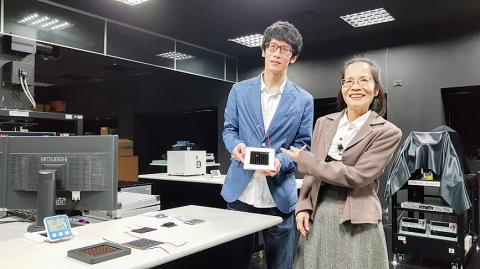Members of National Central University’s (NCU) Research Center for New Generation Photovoltaics yesterday announced that they have developed efficient perovskite solar cells that work in room lighting and are working with groups in Japan to improve verification techniques for cell efficiency.
Using perovskite — a calcium titanium oxide mineral whose chemical structure can be reproduced in the laboratory from various elements — to develop solar cells is a competitive field, as cell efficiency has skyrocketed from 3.8 percent in 2009 to 23.7 percent last year, said Wu Chun-guey (吳春桂), a chemistry department professor and director of the center.
Her team has developed perovskite solar cells up to 100m2 that can be used in room lighting to charge simple laboratory devices such as hygrometers, Wu said.

Photo: Chien Hui-ju, Taipei Times
The cells can be made into thin-film layers, so the team would like to collaborate with other researchers to develop applications for space technology, she said.
A perovskite solar cell has a layer of lead — less than 0.01 percent of its total composition — but the layer can be dissolved by a chemical solution, making it easier to recycle than silicon solar cells, she said.
In 2012, the chemistry department received funding from the Ministry of Science and Technology to establish an advanced laboratory of accommodation and research for organic photovoltaics, and since then, the team has been working with Japan’s National Institute of Advanced Industrial Science and Technology and others to develop better ways of verifying the efficiency of solar cells, she said.
Taiwan, Japan, South Korea, the US, Germany and Italy are the world’s leaders in developing the techniques, Wu added.
In 2017, the department’s Photovoltaic Efficiency Verification Laboratory became the nation’s first university laboratory to obtain ISO/IEC 17025 accreditation from the Taiwan Accreditation Foundation for solar cell calibration.
To test cell efficiency under various lighting conditions, the laboratory is equipped with a solar simulator, indoor lighting and LED lighting systems, said Chen Chia-yuan (陳家原), an assistant professor in the department, adding that the LED-lit environment is key to solar cell development.
Tokyo-based Ishikawa Trading Co has asked the laboratory to test sample solar cells, and a contract is expected to be signed later this year, he said.

‘DENIAL DEFENSE’: The US would increase its military presence with uncrewed ships, and submarines, while boosting defense in the Indo-Pacific, a Pete Hegseth memo said The US is reorienting its military strategy to focus primarily on deterring a potential Chinese invasion of Taiwan, a memo signed by US Secretary of Defense Pete Hegseth showed. The memo also called on Taiwan to increase its defense spending. The document, known as the “Interim National Defense Strategic Guidance,” was distributed this month and detailed the national defense plans of US President Donald Trump’s administration, an article in the Washington Post said on Saturday. It outlines how the US can prepare for a potential war with China and defend itself from threats in the “near abroad,” including Greenland and the Panama

A magnitude 4.9 earthquake struck off Tainan at 11:47am today, the Central Weather Administration (CWA) said. The hypocenter was 32.3km northeast of Tainan City Hall at a depth of 7.3km, CWA data showed. The intensity of the quake, which gauges the actual effect of a seismic event, measured 4 in Tainan and Chiayi County on Taiwan's seven-tier intensity scale, the data showed. The quake had an intensity of 3 in Chiayi City and County, and Yunlin County, while it was measured as 2 in Kaohsiung, Nantou County, Changhua County, Taitung County and offshore Penghu County, the data showed. There were no immediate reports of

The Chinese Nationalist Party (KMT) is maintaining close ties with Beijing, the Democratic Progressive Party (DPP) said yesterday, hours after a new round of Chinese military drills in the Taiwan Strait began. Political parties in a democracy have a responsibility to be loyal to the nation and defend its sovereignty, DPP spokesman Justin Wu (吳崢) told a news conference in Taipei. His comments came hours after Beijing announced via Chinese state media that the Chinese People’s Liberation Army’s Eastern Theater Command was holding large-scale drills simulating a multi-pronged attack on Taiwan. Contrary to the KMT’s claims that it is staunchly anti-communist, KMT Deputy

RESPONSE: The government would investigate incidents of Taiwanese entertainers in China promoting CCP propaganda online in contravention of the law, the source said Taiwanese entertainers living in China who are found to have contravened cross-strait regulations or collaborated with the Chinese Communist Party (CCP) could be subject to fines, a source said on Sunday. Several Taiwanese entertainers have posted on the social media platform Sina Weibo saying that Taiwan “must be returned” to China, and sharing news articles from Chinese state media. In response, the Mainland Affairs Council (MAC) has asked the Ministry of Culture to investigate whether the entertainers had contravened any laws, and asked for them to be questioned upon their return to Taiwan, an official familiar with the matter said. To curb repeated